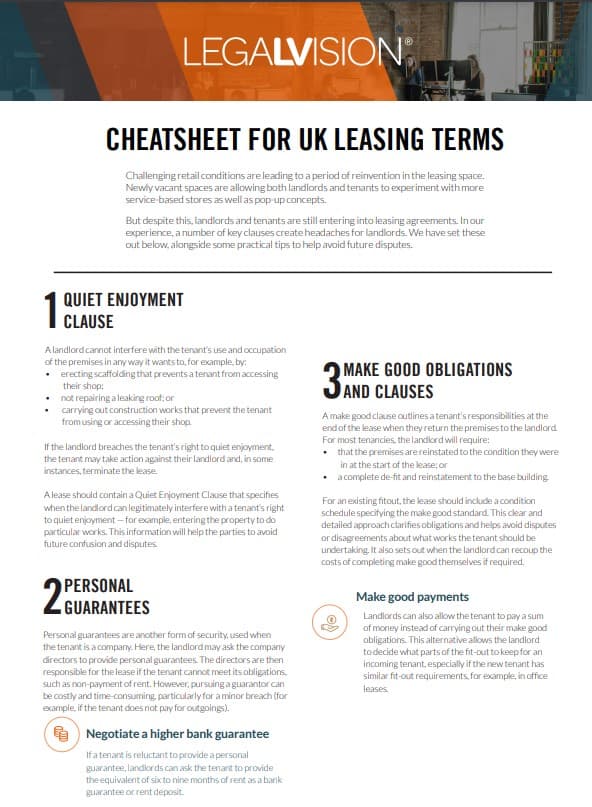Table of Contents
When you lease your commercial property to a business owner, they will be your commercial tenant for the lease term. However, leases do not always run smoothly; sometimes, a tenant’s breach of their lease obligations can be a problem. Where this occurs, you may consider your right, as a landlord, to forfeit the lease. This article will explore the key considerations before forfeiting a lease.
What is Forfeiture?
Forfeiture in a commercial lease is where the landlord evicts a tenant, and the lease terminates. This process allows the landlord to gain access to the property and take back possession, otherwise known as ‘re-entry’.
A landlord may decide to forfeit their lease because their tenant does not comply with their obligations. The lease agreement may also specify other instances where forfeiture can occur. Notably, forfeiting a lease may only be an available option if your lease contains a forfeiture clause.
Forfeiting a commercial lease is a significant action as it means the lease no longer exists. Therefore, commercial landlords must consider specific issues before taking this action.
Key Considerations
Is This the Most Appropriate Action?
Before deciding to forfeit your commercial lease, consider whether this is the most appropriate action in the circumstances. Notably, is there a real benefit to taking back possession of your property? It follows that you must begin advertising your property and looking for a new tenant. There may also be a period when you are without rental income.
If you can discuss the issues with your tenant and come to a resolution, forfeiture is unnecessary. Negotiation with your commercial tenant can be highly relevant where their lease breach is not for rent arrears.
There are other, less extreme alternatives to forfeiture. If the reason for a breach of the lease is that your tenant has unpaid rent, you may be able to secure the rent another way. For example, you might:
- draw on your tenant’s rent deposit;
- speak to a guarantor (if there is one) and ask them to pay the unpaid rent;
- initiate a standard claim for debt recovery with your county court to cover the arrears; or
- initiate the commercial rent arrears recovery process.
What are the Potential Repercussions?
Forfeiture of a commercial lease is not without repercussions for a landlord. For instance, you will likely be left with a vacant property you must lease again to gain income. This requires you to assess the current rental market, as this will indicate how fast or slow it may be to find a new commercial tenant. When you do so, it is helpful to consider:
- current average rental amounts;
- length of time properties have been on the market; and
- number of similar commercial properties currently on the market.
You need to consider the possibility that you could face harsh competition or that demand is low. Consequently, the reality is that you may left without a new tenant and incoming rent for some time.
As well as a lack of rental income, you will need to take steps to secure your property. If left vacant for some time, you run the risk of squatters, which could cause long-term issues for you as a property owner. Long-term squatters could become the registered owners of your commercial property.
By assessing the potential repercussions of the forfeiture process, you should get a clear indication as to whether forfeiture is genuinely beneficial for you or not.
Do You Need Legal Advice?
A final but equally important question you should ask yourself before forfeiting a commercial lease is whether you need to take legal advice. Your commercial lease is a legally binding contract between you and your tenant. Your agreement details the rights and obligations that accompany this.
Before you begin to gain possession of your property, you need to consult your lease agreement. For instance, there may be detailed steps to follow to ensure the forfeiture process is conducted properly as per the agreement. There may also be compulsory dispute resolution steps to take. A property solicitor can assist you with the best course of action.

This cheat sheet outlines what you should be aware of in your lease agreement.
Call 0808 196 8584 for urgent assistance.
Otherwise, complete this form and we will contact you within one business day.
Key Takeaways
If you are a commercial landlord thinking about the forfeiture of your lease, you need to consider some key issues before doing so. Forfeiting a lease is a significant move, and it is best to consider alternative, less extreme actions.
If you are considering forfeiting a lease, our experienced leasing lawyers can assist as part of our LegalVision membership. For a low monthly fee, you will have unlimited access to lawyers to answer your questions and draft and review your documents for a low monthly fee. Call us today on 0808 196 8584 or visit our membership page.
Frequently Asked Questions
What is forfeiture in a commercial lease?
Forfeiture in a commercial lease is the process by which a landlord evicts a tenant, resulting in the termination of the lease. This allows the landlord to regain possession of the property, also known as ‘re-entry.’
When can a landlord forfeit a commercial lease?
A landlord can forfeit a commercial lease if the tenant breaches their lease obligations or if other conditions specified in the lease agreement are met. However, forfeiture is only an option if the lease contains a forfeiture clause.
We appreciate your feedback – your submission has been successfully received.








